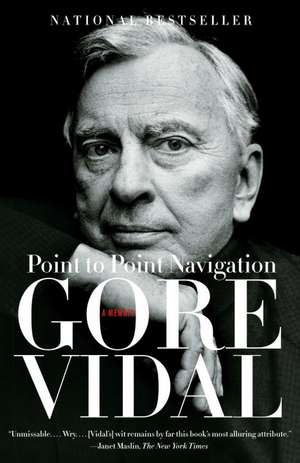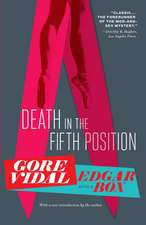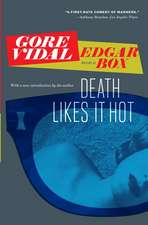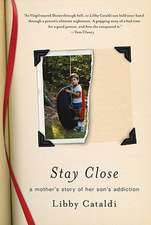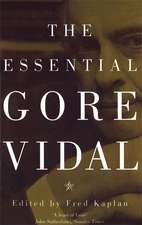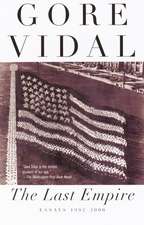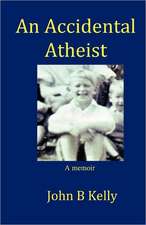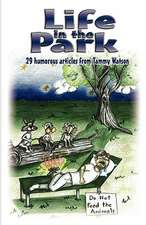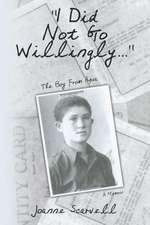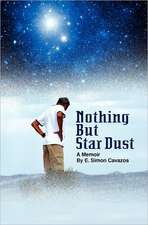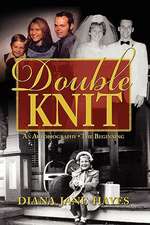Point to Point Navigation: A Memoir 1964 to 2006
Autor Gore Vidalen Limba Engleză Paperback – 30 sep 2007
Preț: 103.66 lei
Nou
Puncte Express: 155
Preț estimativ în valută:
19.83€ • 20.71$ • 16.38£
19.83€ • 20.71$ • 16.38£
Carte disponibilă
Livrare economică 25 martie-08 aprilie
Preluare comenzi: 021 569.72.76
Specificații
ISBN-13: 9780307275011
ISBN-10: 0307275019
Pagini: 277
Ilustrații: 30 HALFTONES
Dimensiuni: 134 x 202 x 15 mm
Greutate: 0.28 kg
Editura: Vintage Books USA
ISBN-10: 0307275019
Pagini: 277
Ilustrații: 30 HALFTONES
Dimensiuni: 134 x 202 x 15 mm
Greutate: 0.28 kg
Editura: Vintage Books USA
Notă biografică
Gore Vidal is the author of twenty-two novels, five plays, many screenplays, more than two hundred essays, and the critically lauded memoir, Palimpsest. Vidal's United States (Essays 1952-92) won the 1993 National Book Award. Vidal lives in Beverly Hills, California.
Extras
ONE
The Influence of the Movies on My Generation: The Backstory
As I now move, graciously, I hope, toward the door marked Exit, it occurs to me that the only thing I ever really liked to do was go to the movies. Naturally, Sex and Art always took precedence over cinema but neither ever proved to be as dependable as the filtering of present light through that moving strip of celluloid which projects past images and voices onto a screen. Thus, in a seemingly simple process, screening history. (My book of that name has been allowed to go out of print and so I now reprise its principal argument.)
As writer and political activist, I have accumulated a number of cloudy trophies in my melancholy luggage. Some real, some imagined. Some acquired from life, such as it is; some from movies, such as they are. Sometimes, in time, where we are as well as were, it is not easy to tell the two apart. Do I wake or sleep?
I was born October 3, 1925, on the twenty-fifth birthday of Thomas Wolfe, the novelist not the journalist. I have lived through three-quarters of the twentieth century, and about one-third of the history of the United States of America. Briefly, what has been your impression thus far, Mr. Vidal? as eager interviewers are wont to ask. Well, it could have been worse, I begin with a calculated understatement. Then the Japanese recording machine goes on the blink and while the interviewer tries to fix it, he asks me to tell him, off the record, what was Marilyn Monroe really like? As I barely knew her, I tell him.
It is a universal phenomenon that whether one is at Harvard or at Oxford or at the University of Bologna, after the dutiful striking of attitudes on subjects of professional interest, like semiology, the ice does not break until someone mentions the movies. Suddenly, everyone is alert and adept. There is real passion as we speak of the falling-off of Fellini in recent years (of which more later) or of Madonna's curious contours and have they yet passed the once-disputed border of mere androgyny, arriving at some entirely new sexual continuum? Movies are the lingua franca of the twentieth century. The Tenth Muse, as they call the movies in Italy, has driven the other nine right off Parnassus—or off the peak, anyway.
Recently I observed to a passing tape recorder that I was once a famous novelist. When assured, politely, that I was still known and read, I explained myself. I was speaking, I said, not of me personally but of a category to which I once belonged that has now ceased to exist. I am still here but the category is not. To speak today of a famous novelist is like speaking of a famous cabinetmaker or speedboat designer. Adjective is inappropriate to noun. How can a novelist be famous—no matter how well known he may be personally to the press?—if the novel itself is of little consequence to the civilized, much less to the generality? The novel as teaching aid is something else, but hardly famous.
There is no such thing as a famous novelist now, any more than there is such a thing as a famous poet. I use the adjective in the strict sense. According to authority, to be famous is to be much talked about, usually in a favorable way. It is as bleak and inglorious as that. Yet thirty years ago, novels were actually read and discussed by those who did not write them or, indeed, even read them. A book could be famous then but today's public seldom mentions a book unless, like The Da Vinci Code, it is being metamorphosed into a faith–challenging film.
Contrary to what many believe, literary fame has nothing to do with excellence or true glory or even with a writer's position in the syllabus of a university's English Department, itself as remote to the Agora as Academe's shadowy walk. For any artist, fame is the extent to which the Agora finds interesting his latest work. If what he has written is known only to a few other practitioners, or to enthusiasts (Faulkner compared lovers of literature to dog breeders, few in number but passionate to the point of madness on the subject of bloodlines), then the artist is not only not famous, he is irrelevant to his time, the only time that he has; nor can he dream of eager readers in a later century as did Stendhal. If novels and poems fail to interest the Agora today, by the year 3091 such artifacts will not exist at all except as objects of monkish interest. This is neither a good nor a bad thing. It is simply not a famous thing.
Optimists, like the late John Gardner, regarded the university as a great good place where literature would continue to be not only worshipped but created. Perhaps he was right, though I do not like the look of those fierce theoreticians currently hacking away at the olive trees of Academe while seeding the Cephisus River with significant algae, their effect on the sacred waters rather like that of an oil spill off the coast of Alaska. Can there be a famous literary theoretician? Alas, no. The Agora has no interest in parlor games, other than contract bridge when one of the players is Omar Sharif. Literary theory is a glass-bead game whose reward for the ludic player is the knowledge that once he masters it, he will be thought by his peers to be ludicrous.
But I have lately been taken to task by an English teacher for my “intemperate” attacks on English Departments, which have, she noted ominously, cost me my place in the syllabus. So I shall now desist and, like Jonah, wait for that greatest of fishes to open wide his jaws and take me in. After all, if you miss one syllabus, there'll always be another in the next decade.
The best of our literary critics was V. S. Pritchett. I find fascinating his descriptions of what the world was like in his proletarian youth. Books were central to the Agora of 1914. Ordinary Londoners were steeped in literature, particularly Dickens. People saw themselves in literary terms, saw themselves as Dickensian types while Dickens himself, earlier, had mirrored the people in such a way that writer and Agora were, famously, joined; and each defined the other.
In London, Pritchett and I belonged to the same club. One afternoon we were sitting in the bar when a green-faced bishop stretched out his gaitered leg and tripped up a rosy-faced mandarin from Whitehall. As the knight fell against the wall, the bishop roared, “Pelagian heretic!”I stared with wonder. Pritchett looked very pleased. “Never forget,” he said, “Dickens was a highly realistic novelist.”
Today, where literature was movies are. Whether or not the Tenth Muse does her act on a theater screen or within the cathode tube, there can be no other reality for us since reality does not begin to mean until it has been made art of. For the Agora, Art is now sight and sound; and the books are shut. In fact, reading of any kind is on the decline. Half the American people never read a newspaper. Half never vote for president—the same half?
TWO
In 1925, the year that I was born, An American Tragedy, Arrowsmith, Manhattan Transfer, and The Great Gatsby were published. A nice welcoming gift, I observed to the Three Wise Men from PEN who attended me in my cradle, a bureau drawer in Washington, D.C.'s, Rock Creek Park. I shall be worthy! I proclaimed; shepherds quaked.
For a moment, back then, it did look as if Whitman’s dream of that great audience which would in turn create great writers had come true. Today, of course, when it comes to literacy, the United States ranks number twenty–three in the world. I have no idea what our ranking was then, but though the popular culture was a predictable mix of jazz and the Charleston and Billy Sunday, we must have had, proportionately, more and better readers then than now; literature was a part of life, and characters from contemporary fiction, like Babbitt, entered the language, as they had done in Pritchett's youth and before. Our public educational system was also a good one. Certainly the McGuffey’s Eclectic Readers of my grandfather's day would now be considered intolerably highbrow.
True, the Tenth Muse was already installed atop Parnassus, but she was mute. Actually, the movies were not as popular in the twenties as they had been before the First World War. Even so, in the year of my birth, Chaplin’s The Gold Rush was released, while in my second year there appeared not only DeMille’s The Ten Commandments as well as, no doubt in the interest of symmetry, Flesh and the Devil with Greta Garbo; it was also in my second year that the Tenth Muse suddenly spoke those minatory words “You ain't heard nothin’ yet.” Thus, the moving and talking picture began.
I saw and heard my first movie in 1929. My father and mother were still unhappily married and so we went, a nuclear family melting down, to the movies in St. Louis, where my father was general manager of TAT, the first transcontinental airline, later to merge with what became TWA.
I am told that as I marched down the aisle, an actress on the screen asked another character a question, and I answered her, in a very loud voice. So, as the movies began to talk, I began to answer questions posed by two-dimensional fictional characters thirty times my size.
My life has paralleled, when not intersected, the entire history of the talking picture. Although I was a compulsive reader from the age of six, I was so besotted by movies that one Saturday in Washington, D.C., where I grew up, I saw five movies in a day. It took time and effort and money to see five movies in a day; now, with television and videocassettes and DVDs, the screen has come to the viewer and we are all home communicants.
I don’t think anyone has ever found startling the notion that it is not what things are that matters so much as how they are perceived. We perceive sex, say, not as it demonstrably is but as we think it ought to be as carefully distorted for us by the churches and the schools, and by—triumphantly—the movies, which are, finally, the only validation to which that dull anterior world, reality, must submit.
THREE
The screening by CNN of our latest wars is carefully directed by those who are producing the wars. What these serial wars are all about is still not clear to us, nor are we ever apt to know what really happened until someone makes a backstage movie like The Bad and the Beautiful or, perhaps, Platoon in the Desert, a bitter, powerful film, quite as unrealistic, in its way, as the CNN-Pentagon releases.
In February 1991 history was being invented before our eyes. From day to day we saw the editing and dubbing process at work. But we were merely viewers, while the actors on-screen were also, in an eerie way, passive: part of a process no one seemed to be in control of. Rumsfeld who now seeks to produce the sequels is, despite his elfin charms, no more than a thousand points of pulsing light in a cathode ray tube.
A few years ago while giving the Massey Lectures at Harvard the mood of prophecy was upon me! “We shall yet be invited,” I said, “by the sponsors of USA, Inc., to bear witness to a presidential election in which one of the heroes of the Gulf will confront the politically ambitious Terminator.” Yes, it will be someone like Rumsfeld versus Schwarzenegger, the ultimate screen version of my own old movie The Best Man, whose title was, of course, ironic.
FOUR
I was struck by Eudora Welty's contribution to Harvard’s Massey Lectures, published as One Writer's Beginnings. I have not her courage when it comes to speaking of my own life. I have also never been my own subject. But I do like the way that she set her scene, in Jackson, Mississippi, where her life and her life as a writer began. She starts, as everyone must, with a family. I could do the same, but do I dare? Contrary to legend, I was born of mortal woman, and if Zeus sired me, there is no record on file in the Cadet Hospital at the U.S. Military Academy, West Point. But if I was usually born, there my resemblance to other writers ends. My mother did not shop; and my father was not cold and aloof, nor was he addicted to the sports page of the newspapers. Unlike most American fathers—sons, too—he did not live vicariously. He was his own hero, and the Agora had loved him for a time. He had been an all–American football player at West Point, and he had represented the United States in the pentathlon at the Olympic Games. Later, he started three airlines. He was, I like to believe, the first person to realize that there was absolutely no point to cellophane as opposed to blessed celluloid.
“DuPont just invented this,”he said, presenting me with a glassy cylinder. We unrolled the cellophane. “What's it for?” I asked. “Nothing!” He spoke with a true inventor's delight. For a season, in the thirties, one could see in the movie musicals cellophane used as curtains, tablecloths, showgirl dresses. Finally, cellophane, unlike celluloid, ended up as irrelevant wrapping. Yet it was nice in itself, like today's novel, say, or, as Cole Porter apostrophized in “You're the Top,” “You're cellophane!”
Did my kindly maternal grandfather—from Mississippi, just like Eudora’s—preside over a hardware business in Oklahoma City? No. From two unrelated accidents, he was blind at the age of ten. He put himself through law school, memorizing texts that were read to him by a cousin. At thirty-seven, having helped invent the state of Oklahoma—wit of this sort runs in our family—he became their famous senator.
Did my mother play bridge, bake pies in the kitchen, and perhaps drink too much of the cooking sherry? On the contrary, she was a flapper very like her coeval, Tallulah Bankhead. (Faulkner went to his grave believing that coeval meant evil at the same time as.) In appearance she was a composite of Bette Davis and Joan Crawford. She never baked a pie, but she did manage to drink, in the course of a lifetime, the equivalent of the Chesapeake Bay in vodka. Eudora's people, just south of where the Gores lived, thought my mother fast. They were right. She married and divorced not only my famous father but a rich stockbroker; then she married a famous air force general, who promptly died. Meanwhile, the stockbroker married a woman whose daughter married a man who was elected president only to have his head shot in as the two of them were driving through Dallas on a hot November day. What is one to do, fictionally, with a family that has itself become a pervasive fiction that continues to divert the Agora? Later, I will try to reveal what actually happened that terrible day in Dallas.
From the Hardcover edition.
The Influence of the Movies on My Generation: The Backstory
As I now move, graciously, I hope, toward the door marked Exit, it occurs to me that the only thing I ever really liked to do was go to the movies. Naturally, Sex and Art always took precedence over cinema but neither ever proved to be as dependable as the filtering of present light through that moving strip of celluloid which projects past images and voices onto a screen. Thus, in a seemingly simple process, screening history. (My book of that name has been allowed to go out of print and so I now reprise its principal argument.)
As writer and political activist, I have accumulated a number of cloudy trophies in my melancholy luggage. Some real, some imagined. Some acquired from life, such as it is; some from movies, such as they are. Sometimes, in time, where we are as well as were, it is not easy to tell the two apart. Do I wake or sleep?
I was born October 3, 1925, on the twenty-fifth birthday of Thomas Wolfe, the novelist not the journalist. I have lived through three-quarters of the twentieth century, and about one-third of the history of the United States of America. Briefly, what has been your impression thus far, Mr. Vidal? as eager interviewers are wont to ask. Well, it could have been worse, I begin with a calculated understatement. Then the Japanese recording machine goes on the blink and while the interviewer tries to fix it, he asks me to tell him, off the record, what was Marilyn Monroe really like? As I barely knew her, I tell him.
It is a universal phenomenon that whether one is at Harvard or at Oxford or at the University of Bologna, after the dutiful striking of attitudes on subjects of professional interest, like semiology, the ice does not break until someone mentions the movies. Suddenly, everyone is alert and adept. There is real passion as we speak of the falling-off of Fellini in recent years (of which more later) or of Madonna's curious contours and have they yet passed the once-disputed border of mere androgyny, arriving at some entirely new sexual continuum? Movies are the lingua franca of the twentieth century. The Tenth Muse, as they call the movies in Italy, has driven the other nine right off Parnassus—or off the peak, anyway.
Recently I observed to a passing tape recorder that I was once a famous novelist. When assured, politely, that I was still known and read, I explained myself. I was speaking, I said, not of me personally but of a category to which I once belonged that has now ceased to exist. I am still here but the category is not. To speak today of a famous novelist is like speaking of a famous cabinetmaker or speedboat designer. Adjective is inappropriate to noun. How can a novelist be famous—no matter how well known he may be personally to the press?—if the novel itself is of little consequence to the civilized, much less to the generality? The novel as teaching aid is something else, but hardly famous.
There is no such thing as a famous novelist now, any more than there is such a thing as a famous poet. I use the adjective in the strict sense. According to authority, to be famous is to be much talked about, usually in a favorable way. It is as bleak and inglorious as that. Yet thirty years ago, novels were actually read and discussed by those who did not write them or, indeed, even read them. A book could be famous then but today's public seldom mentions a book unless, like The Da Vinci Code, it is being metamorphosed into a faith–challenging film.
Contrary to what many believe, literary fame has nothing to do with excellence or true glory or even with a writer's position in the syllabus of a university's English Department, itself as remote to the Agora as Academe's shadowy walk. For any artist, fame is the extent to which the Agora finds interesting his latest work. If what he has written is known only to a few other practitioners, or to enthusiasts (Faulkner compared lovers of literature to dog breeders, few in number but passionate to the point of madness on the subject of bloodlines), then the artist is not only not famous, he is irrelevant to his time, the only time that he has; nor can he dream of eager readers in a later century as did Stendhal. If novels and poems fail to interest the Agora today, by the year 3091 such artifacts will not exist at all except as objects of monkish interest. This is neither a good nor a bad thing. It is simply not a famous thing.
Optimists, like the late John Gardner, regarded the university as a great good place where literature would continue to be not only worshipped but created. Perhaps he was right, though I do not like the look of those fierce theoreticians currently hacking away at the olive trees of Academe while seeding the Cephisus River with significant algae, their effect on the sacred waters rather like that of an oil spill off the coast of Alaska. Can there be a famous literary theoretician? Alas, no. The Agora has no interest in parlor games, other than contract bridge when one of the players is Omar Sharif. Literary theory is a glass-bead game whose reward for the ludic player is the knowledge that once he masters it, he will be thought by his peers to be ludicrous.
But I have lately been taken to task by an English teacher for my “intemperate” attacks on English Departments, which have, she noted ominously, cost me my place in the syllabus. So I shall now desist and, like Jonah, wait for that greatest of fishes to open wide his jaws and take me in. After all, if you miss one syllabus, there'll always be another in the next decade.
The best of our literary critics was V. S. Pritchett. I find fascinating his descriptions of what the world was like in his proletarian youth. Books were central to the Agora of 1914. Ordinary Londoners were steeped in literature, particularly Dickens. People saw themselves in literary terms, saw themselves as Dickensian types while Dickens himself, earlier, had mirrored the people in such a way that writer and Agora were, famously, joined; and each defined the other.
In London, Pritchett and I belonged to the same club. One afternoon we were sitting in the bar when a green-faced bishop stretched out his gaitered leg and tripped up a rosy-faced mandarin from Whitehall. As the knight fell against the wall, the bishop roared, “Pelagian heretic!”I stared with wonder. Pritchett looked very pleased. “Never forget,” he said, “Dickens was a highly realistic novelist.”
Today, where literature was movies are. Whether or not the Tenth Muse does her act on a theater screen or within the cathode tube, there can be no other reality for us since reality does not begin to mean until it has been made art of. For the Agora, Art is now sight and sound; and the books are shut. In fact, reading of any kind is on the decline. Half the American people never read a newspaper. Half never vote for president—the same half?
TWO
In 1925, the year that I was born, An American Tragedy, Arrowsmith, Manhattan Transfer, and The Great Gatsby were published. A nice welcoming gift, I observed to the Three Wise Men from PEN who attended me in my cradle, a bureau drawer in Washington, D.C.'s, Rock Creek Park. I shall be worthy! I proclaimed; shepherds quaked.
For a moment, back then, it did look as if Whitman’s dream of that great audience which would in turn create great writers had come true. Today, of course, when it comes to literacy, the United States ranks number twenty–three in the world. I have no idea what our ranking was then, but though the popular culture was a predictable mix of jazz and the Charleston and Billy Sunday, we must have had, proportionately, more and better readers then than now; literature was a part of life, and characters from contemporary fiction, like Babbitt, entered the language, as they had done in Pritchett's youth and before. Our public educational system was also a good one. Certainly the McGuffey’s Eclectic Readers of my grandfather's day would now be considered intolerably highbrow.
True, the Tenth Muse was already installed atop Parnassus, but she was mute. Actually, the movies were not as popular in the twenties as they had been before the First World War. Even so, in the year of my birth, Chaplin’s The Gold Rush was released, while in my second year there appeared not only DeMille’s The Ten Commandments as well as, no doubt in the interest of symmetry, Flesh and the Devil with Greta Garbo; it was also in my second year that the Tenth Muse suddenly spoke those minatory words “You ain't heard nothin’ yet.” Thus, the moving and talking picture began.
I saw and heard my first movie in 1929. My father and mother were still unhappily married and so we went, a nuclear family melting down, to the movies in St. Louis, where my father was general manager of TAT, the first transcontinental airline, later to merge with what became TWA.
I am told that as I marched down the aisle, an actress on the screen asked another character a question, and I answered her, in a very loud voice. So, as the movies began to talk, I began to answer questions posed by two-dimensional fictional characters thirty times my size.
My life has paralleled, when not intersected, the entire history of the talking picture. Although I was a compulsive reader from the age of six, I was so besotted by movies that one Saturday in Washington, D.C., where I grew up, I saw five movies in a day. It took time and effort and money to see five movies in a day; now, with television and videocassettes and DVDs, the screen has come to the viewer and we are all home communicants.
I don’t think anyone has ever found startling the notion that it is not what things are that matters so much as how they are perceived. We perceive sex, say, not as it demonstrably is but as we think it ought to be as carefully distorted for us by the churches and the schools, and by—triumphantly—the movies, which are, finally, the only validation to which that dull anterior world, reality, must submit.
THREE
The screening by CNN of our latest wars is carefully directed by those who are producing the wars. What these serial wars are all about is still not clear to us, nor are we ever apt to know what really happened until someone makes a backstage movie like The Bad and the Beautiful or, perhaps, Platoon in the Desert, a bitter, powerful film, quite as unrealistic, in its way, as the CNN-Pentagon releases.
In February 1991 history was being invented before our eyes. From day to day we saw the editing and dubbing process at work. But we were merely viewers, while the actors on-screen were also, in an eerie way, passive: part of a process no one seemed to be in control of. Rumsfeld who now seeks to produce the sequels is, despite his elfin charms, no more than a thousand points of pulsing light in a cathode ray tube.
A few years ago while giving the Massey Lectures at Harvard the mood of prophecy was upon me! “We shall yet be invited,” I said, “by the sponsors of USA, Inc., to bear witness to a presidential election in which one of the heroes of the Gulf will confront the politically ambitious Terminator.” Yes, it will be someone like Rumsfeld versus Schwarzenegger, the ultimate screen version of my own old movie The Best Man, whose title was, of course, ironic.
FOUR
I was struck by Eudora Welty's contribution to Harvard’s Massey Lectures, published as One Writer's Beginnings. I have not her courage when it comes to speaking of my own life. I have also never been my own subject. But I do like the way that she set her scene, in Jackson, Mississippi, where her life and her life as a writer began. She starts, as everyone must, with a family. I could do the same, but do I dare? Contrary to legend, I was born of mortal woman, and if Zeus sired me, there is no record on file in the Cadet Hospital at the U.S. Military Academy, West Point. But if I was usually born, there my resemblance to other writers ends. My mother did not shop; and my father was not cold and aloof, nor was he addicted to the sports page of the newspapers. Unlike most American fathers—sons, too—he did not live vicariously. He was his own hero, and the Agora had loved him for a time. He had been an all–American football player at West Point, and he had represented the United States in the pentathlon at the Olympic Games. Later, he started three airlines. He was, I like to believe, the first person to realize that there was absolutely no point to cellophane as opposed to blessed celluloid.
“DuPont just invented this,”he said, presenting me with a glassy cylinder. We unrolled the cellophane. “What's it for?” I asked. “Nothing!” He spoke with a true inventor's delight. For a season, in the thirties, one could see in the movie musicals cellophane used as curtains, tablecloths, showgirl dresses. Finally, cellophane, unlike celluloid, ended up as irrelevant wrapping. Yet it was nice in itself, like today's novel, say, or, as Cole Porter apostrophized in “You're the Top,” “You're cellophane!”
Did my kindly maternal grandfather—from Mississippi, just like Eudora’s—preside over a hardware business in Oklahoma City? No. From two unrelated accidents, he was blind at the age of ten. He put himself through law school, memorizing texts that were read to him by a cousin. At thirty-seven, having helped invent the state of Oklahoma—wit of this sort runs in our family—he became their famous senator.
Did my mother play bridge, bake pies in the kitchen, and perhaps drink too much of the cooking sherry? On the contrary, she was a flapper very like her coeval, Tallulah Bankhead. (Faulkner went to his grave believing that coeval meant evil at the same time as.) In appearance she was a composite of Bette Davis and Joan Crawford. She never baked a pie, but she did manage to drink, in the course of a lifetime, the equivalent of the Chesapeake Bay in vodka. Eudora's people, just south of where the Gores lived, thought my mother fast. They were right. She married and divorced not only my famous father but a rich stockbroker; then she married a famous air force general, who promptly died. Meanwhile, the stockbroker married a woman whose daughter married a man who was elected president only to have his head shot in as the two of them were driving through Dallas on a hot November day. What is one to do, fictionally, with a family that has itself become a pervasive fiction that continues to divert the Agora? Later, I will try to reveal what actually happened that terrible day in Dallas.
From the Hardcover edition.
Recenzii
“Unmissable. . . . Wry. . . . [Vidal’s] wit remains by far this book's most alluring attribute.”
—Janet Maslin, The New York Times
“Engaging. . . . Point to Point Navigation is a stirring political protest, a meditation on the fleeting nature of memory, and, quite movingly, an elegiac rumination on loss.”
—Vogue
“Touchingly elegiac. . . . Even mortality and aging seem somehow less formidable in the company of such a witty, penetrating–and unfailingly nervy intelligence.”
—Francine Prose, O, The Oprah Magazine
—Janet Maslin, The New York Times
“Engaging. . . . Point to Point Navigation is a stirring political protest, a meditation on the fleeting nature of memory, and, quite movingly, an elegiac rumination on loss.”
—Vogue
“Touchingly elegiac. . . . Even mortality and aging seem somehow less formidable in the company of such a witty, penetrating–and unfailingly nervy intelligence.”
—Francine Prose, O, The Oprah Magazine
Descriere
In this brilliant sequel to his acclaimed, bestselling memoir, "Palimpsest," celebrated novelist, essayist, critic, and controversialist Gore Vidal ranges freely over his remarkable life with the signature wit and literary elegance that is uniquely his.
